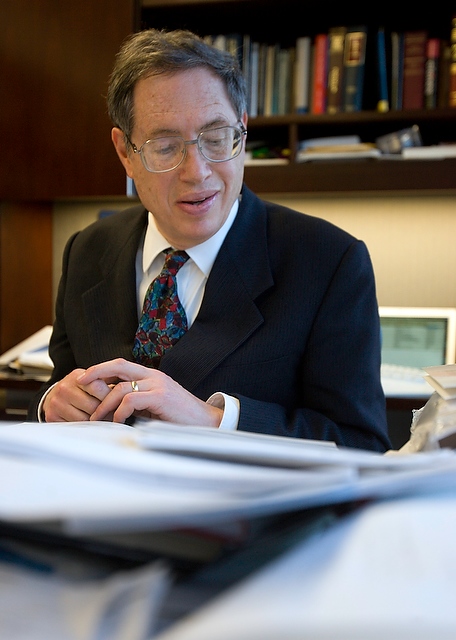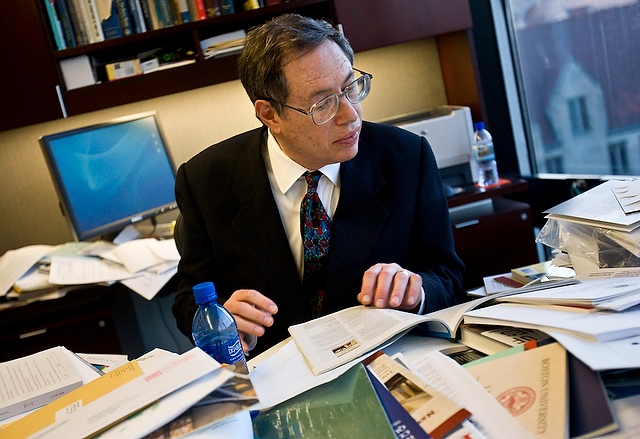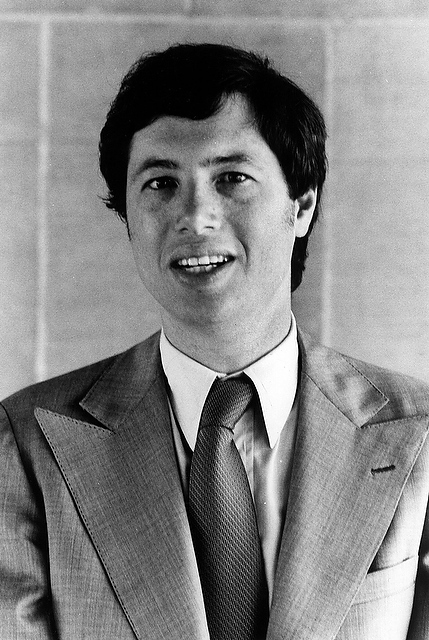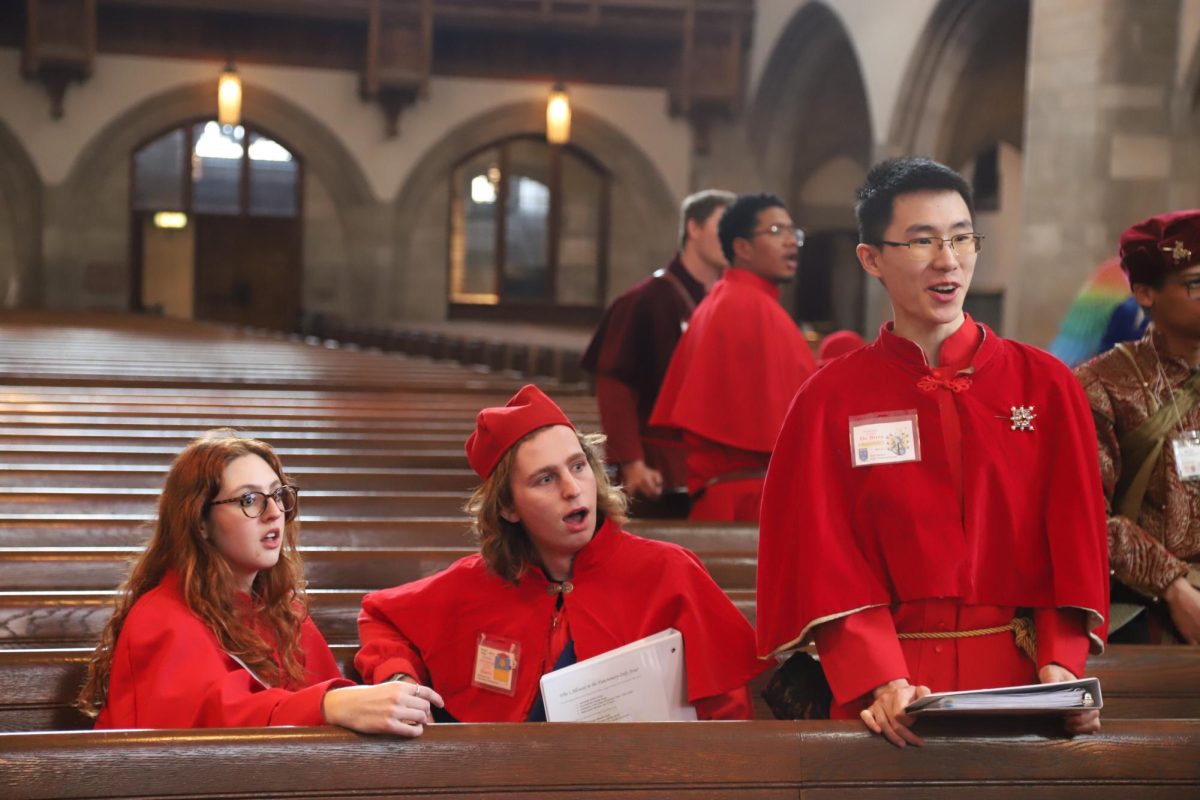


There’s not a lot that gets by Richard Epstein.
Before I could begin interviewing one of the University’s most renowned legal scholars, he put a rapid-fire series of questions to me about my own background. Within 30 seconds he correctly pegged me as the daughter of an immigrant biochemist and was satisfied. “Upwardly mobile as usual,” he said.
After 40 years of teaching and scholarship, drawing quick, frank conclusions is in Epstein’s nature. Yet in spite of his imposing body of work and confident libertarian views, Epstein takes precautions against becoming dogmatic. Whether by teaching new courses every year or by keeping a standing promise to argue with anyone who disagrees with him, Epstein continually finds ways to stay on his toes.
Supriya Sinhababu: So you’re going to be at NYU in 2010?
Richard Epstein: That’s so complicated…. The original expectation was that I would teach some here—I’m a fellow at [Stanford’s] Hoover Institution, I’d teach some there—and that I would be kind of a permanent visitor at NYU. And when they made the tenured offer, it changed the calculation. And in principle at least, I am able to come here to teach in the spring quarter. Whether this will actually happen, it’s hard to say. It will surely happen next year in 2010. It probably will happen in 2011.
But the further you go along, the older I get, and the more uncertain all these things get…. In some sense, I’m just a different kind of part-timer. But when I’m here, I try to give it my all.
SS: Is this part of a trend that’s going to be continuing? First Cass Sunstein, now you—
RE: Well the Sunstein thing is completely different. This was driven in part by marriage…. We know he tried to maintain a connection here, but it got overwritten by events and politics.
I think the more important trend is that last year we lost one very distinguished faculty member, but we hired eight others—not as well known and often in very different parts of their cycle. But that’s huge. A lot of what people are worried about at the University of Chicago has been critical mass—we are too small relative to our distinction….
SS: How have students changed over the years?
RE: I think, if anything, students are less extreme in both directions than they used to be. There are very few radicals or deep conservatives. Most of you are basically hard sells. You tend to be non-utopian. You don’t believe extravagant promises made to you from anyone regardless of their political persuasion. So there’s a kind of—it translates into a status quo bias. But it’s a status quo bias against large changes, but not against small, incremental, and sensible ones. So I think students are pretty sane people for the most part today….
SS: Have you thought about running for office?
RE: Ha!
In 1983…my name had been mentioned as a possible federal court judge, mainly at the circuit court, but even one or two people [mentioned] the Supreme Court, which I thought was kind of funny. I wrote an article, which defended, on labor issues, the pre–New Deal arrangements and so-called yellow dog contracts.
When I wrote that article, I said, “This is over. There’ll never be public life for me because the political opposition is there.” So I thought about it for a while—do I really want to cut that out? And I said, I can’t run my life as an academic trying to curry others for a position I’ll never be offered. So why bother? So from that day on, it’s never been a live issue, on either political side, so the answer is really no.
I mean, what disappoints you is when you cannot get your point of view across to the people who are in government…. I don’t know if you know, I write this forbes.com column?
SS: Yeah, I’ve seen it.
RE: All these things, they’re certainly ways of expressing yourself…. The key feature is, you have to have a strong enough brand identification as an intellectual so that people know that everything you write is part of a continuous whole…. I don’t think many people believe that I’m someone who lacks for candor in what he says. It’s okay to be attacked, called a lunatic or whatever phrase you want to use, but what you have to do in all these situations is keep a consistent intellectual persona. And mine’s not consistent with being appointed to any political office by anybody in any political party. And, fine….
If you try to be all things to all people, essentially you’re ineffective at all the things you do. And since I’m basically better as a critic, I write criticism. It’s not personal but intellectual, and people ask me about my views, on, for example, on the anti-discrimination laws of employment rights…. I was told multiple times, “If you write this book, your academic career is through.” And I said, “I’ll take my chances,” and I wrote it. And what I found was, if you sort of apologize for your positions, nobody will respect you.
But if you basically insist that, “Look, I really do believe this stuff, and I think you barked up the wrong tree, and I’m not going to sort of apologize for my positions, I’m going to ask you to apologize for yours,” people are very reluctant to take you on, under those circumstances….
SS: You’ve said that you’re open to arguing with anyone as long as they disagree with you. Is there anyone you hope will take you up on that in the future?
RE: Oh, I just don’t go after people that way…. I’m not a boxer; I don’t sort of look for the fights from the people I think I could beat. You have to be prepared to enter into debates with people who are capable of beating you, if you want to maintain your own respect and credibility….
But as you go on through these things, the new number of novel points that comes up becomes a little bit smaller because you’ve heard some of them before, and hopefully your new system is more adept so you have to make these kinds of shattering changes in position less frequently than you would have when you were 28 years old or something. I think there’s some truth to that.
But at the same time you don’t want to become dogmatic, so what I’ve always tried to do is teach new courses. And this year I’ll teach two new courses here. I think I’ve taught 10 new courses in the last 10 years.… Every year, I try to teach at least one or two things that I’ve taught before so as to make it other than nonstop, but two new courses is not the norm in this business. And I’ve taught 35 or 40 courses over the years.
And you know, I still like to think I could teach any course in the law school, but I know that must be an idle boast somewhere along the line. I’ve not taught bankruptcy. Why not? Securities? Why not?…
SS: Before the 2004 election, you said you were going to vote for anyone but the big two, and—
RE: I believe [I voted for] a candidate that started with B. I still don’t know his name. And you ask why? I mean, my attitude is, to the extent that you think your views matter, you don’t like to vote for candidates because that means you’re aligned with all their positions, some of which you like and some of which you don’t like…. I did not vote for either Obama or McCain. Because I looked at the Democratic platform, and I said, I can’t believe this stuff. I mean you’re certainly free to go to the download of the Epstein-Sunstein debate. Did you hear that?
SS: I did.
RE: You did not hear me sound glowingly pro-Obama on that occasion….
SS: You said [before the 2004 presidential election] you’d vote for anyone but the big two because they’re just two members of the same statist party fighting over whose friends will get favors…. Did you feel the same way about the 2008 election?
RE: Well no, actually, I thought slightly differently. To the extent that one could look at policies, I was much more sympathetic with respect to the McCain position on virtually every economic issue. I thought the Democratic platform contained one blunder after another, much of which again is passed by the wayside. If you remember the debates, Joe Biden gets up there with complete confidence saying, “It’s a no-brainer to be in favor of the windfall profits tax.” Well, are you really going to try that with oil at $39 a barrel? I mean, who are you talking to? And you just don’t think about these things in that fashion. So no.
But McCain did not present himself well. He was old. He was irascible in many cases. People did not want him to be the voice of the United States overseas. And these symbolic issues really mattered. And there were a lot of social conservatives behind him even though he was not a social conservative. So I felt, being a libertarian on economic and social issues to some extent, there really wasn’t a home in either party. So, I stayed out. I think already, many people who voted for Obama have come to realize that “hope” and “change” are two words in the English language, but transformative politics is much more difficult to come by. That is, there was a lot of utopianism. It turns out to be a much harder slog. I think that’s true of Democrats. It’s amazing. Three weeks later, the world doesn’t look so carefree and fancy-free. It’s not like election day and the magical moment in Grant Park.
SS: Speaking of Joe Biden, I know he famously—
RE: Waved the book?
SS: —waved the book [Epstein’s Takings: Private Property and the Power of Eminent Domain], and denounced your work in front of the Supreme Court [at the confirmation hearings of Clarence Thomas].
RE: Well it’s hard to know how to respond to that. There was a kid who called me up at the time…and asked if I would testify. I said, “I’m not going to go there so you can grill me from a bench, and I can’t answer.” But I said to him, “Any time the Senator wants to have a debate on this topic, he can announce the place and the time and the format, and I’ll be there.” I said, “I don’t expect to hear from you.” And I didn’t. I mean, it’s one of the things that’s so terrible about politicians, is that they can grandstand like that. And then the moment someone actually tries to call them on this, what they do is they retreat behind their political prerogatives.
Naturally, this did not favorably predispose me toward [Obama’s] choice as vice president. But [Biden] has not disappointed. He’s been loud, loquacious, and uninformed since he’s taken over this position. And that’s more or less what I expect. It was quite amazing—he gets up there, and he says, “The one thing I’ve learned is that you cannot simply look at judges on the basis of their qualifications alone,” and I thought he was saying, “What you really have to do is say that people who agree with Richard Epstein aren’t fit to serve in public office.” And I agree with that, Mr. Biden, but it’s a two-edged sword, and it may cut back in the opposite direction someday….
CM: Well here’s my question about that—does it make you uneasy at all that the vice president of our country is someone who’s so hostile to your work? Or is that just another day at the office?
RE: Oh, that’s not the reason I’m uneasy about him. The reason I’m uneasy about him is because I don’t trust his judgment, on matters analytical or political. That’s why I’m uneasy about Obama. I know in Hyde Park you’re not supposed to say these things. I don’t think he has the right skill set for the job…. With problems of racial integration and violence, he’s my man because I think he understands that very well. But the last I saw, he had no background in bankruptcy or commercial transactions or macroeconomic theory. So he’s flying blind. People say he will have good advisers. I say you have to know which of your good advisers to listen to. It’s not as easy as having advisers; it’s a much more complex process….








